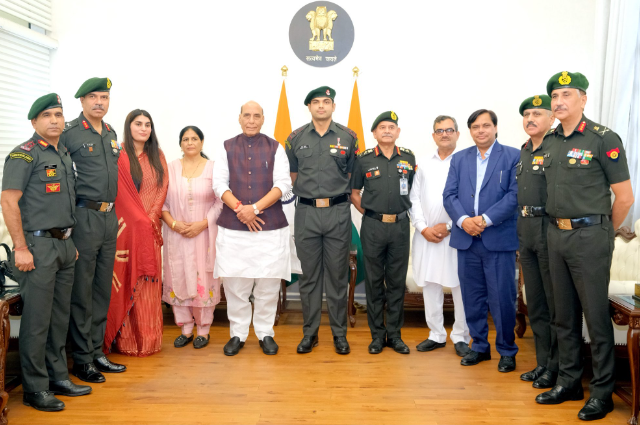In a moment that beautifully captures the spirit of modern India, Neeraj Chopra, the javelin thrower who has repeatedly made the nation to be with pride has been given with the honorary rank of Lieutenant Colonel in the Territorial Army. This isn't merely another medal added to an already glittering collection; it represents something far more profound. It is the formal acknowledgment that excellence transcends the boundaries of playing fields and parade grounds, and that those who inspire millions through their achievements deserve recognition from institutions that embody national values.
What makes this honour particularly meaningful is how it weaves together two seemingly distinct threads of national identity and the rigorous discipline of military service and the passionate pursuit of sporting excellence. In Chopra, we see both these qualities merge seamlessly and a young man who has demonstrated that the values of dedication, perseverance, and unwavering commitment to one's craft are universal, whether one is training for Olympic glory or serving the nation in uniform.
Why This Recognition Matters Beyond the Individual
While this honour celebrates Neeraj Chopra's personal achievements, its significance radiates outward, touching several important aspects of how we think about excellence, service, and national identity. First, it demonstrates a mature integration of national pride across different sectors of society. Military institutions, which traditionally focus on defence and security, are openly celebrating and honouring civilian achievements that have elevated the nation's standing globally. This breaking down of silos between military and civilian spheres creates a more holistic understanding of what it means to serve one's country. Service doesn't always mean carrying a rifle; sometimes it means carrying the hopes of a billion people on your shoulders as you prepare for a throw that could make history.
Second, this recognition serves as powerful encouragement for India's youth, who are navigating increasingly complex choices about their futures. By honouring an athlete with military distinction, the nation is sending a clear message that discipline, dedication, and patriotic commitment are values that transcend specific professions. Whether a young person aspires to athletics, military service, science, arts, or any other field, the underlying principles remain the same and excellence requires sacrifice, success demands discipline, and true achievement brings with it a responsibility to inspire others.
Third, this honour strengthens the increasingly important relationship between sports and national service. Athletes like Chopra are, in their own way, serving the nation and building soft power, inspiring youth towards healthy lifestyles and ambitious goals, and creating moments of unity when the entire country rallies behind them. By formally recognising this contribution through military honours, we acknowledge that nation-building happens on multiple fronts and that those who excel in their chosen fields are all contributing to a larger national project.
Standing Among Giants: A Distinguished Tradition
Neeraj Chopra now joins a very select group of sports personalities who have been similarly honoured by the Indian Armed Forces. The most prominent among these is MS Dhoni, the cricketer who led India to World Cup glory and who holds the honorary rank of Lieutenant Colonel in the Territorial Army. Another is Abhinav Bindra, India's first individual Olympic gold medalist, who has also been recognized for his contributions to the nation's sporting glory.
These aren't just athletes; they are individuals who have fundamentally changed how India sees itself in the global sporting arena. They have created pathways for others to follow and demonstrated that Indians can compete with and defeat the best in the world. That Chopra now stands among them is both fitting and inspiring it shows that this tradition of honouring sporting excellence through military ranks is not a one-time gesture but an evolving practice that recognizes each generation's champions.
A Symbol for Our Times
In an era where national identity is often expressed through complex geopolitical schemes and economic indicators, there is something refreshingly straightforward about celebrating a young man who picked up a javelin and worked relentlessly until he became the best in the world at throwing it. Neeraj Chopra's honorary rank as Lieutenant Colonel is more than a ceremonial title and it is a statement about what we value as a nation and whom we choose to elevate as examples for future generations.
This honour reminds us that excellence, wherever it manifests, deserves recognition. It tells us that the discipline required to master an athletic skill is not fundamentally different from the discipline required in military service. It shows us that representing one's country with pride and determination is a form of service, whether that representation happens on a battlefield or in an Olympic stadium.
As we celebrate this well-deserved honour, we should also recognize what it represents for India's future and a country confident enough to honour diverse forms of excellence, mature enough to see the connections between different types of service, and wise enough to hold up its achievers as beacons for those who will follow. In Lieutenant Colonel Neeraj Chopra, we see not just a champion athlete or an honorary officer but a symbol of what becomes possible when talent meets opportunity, and dedication meets national support.
. . .
References:

